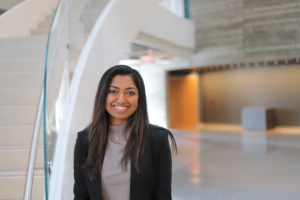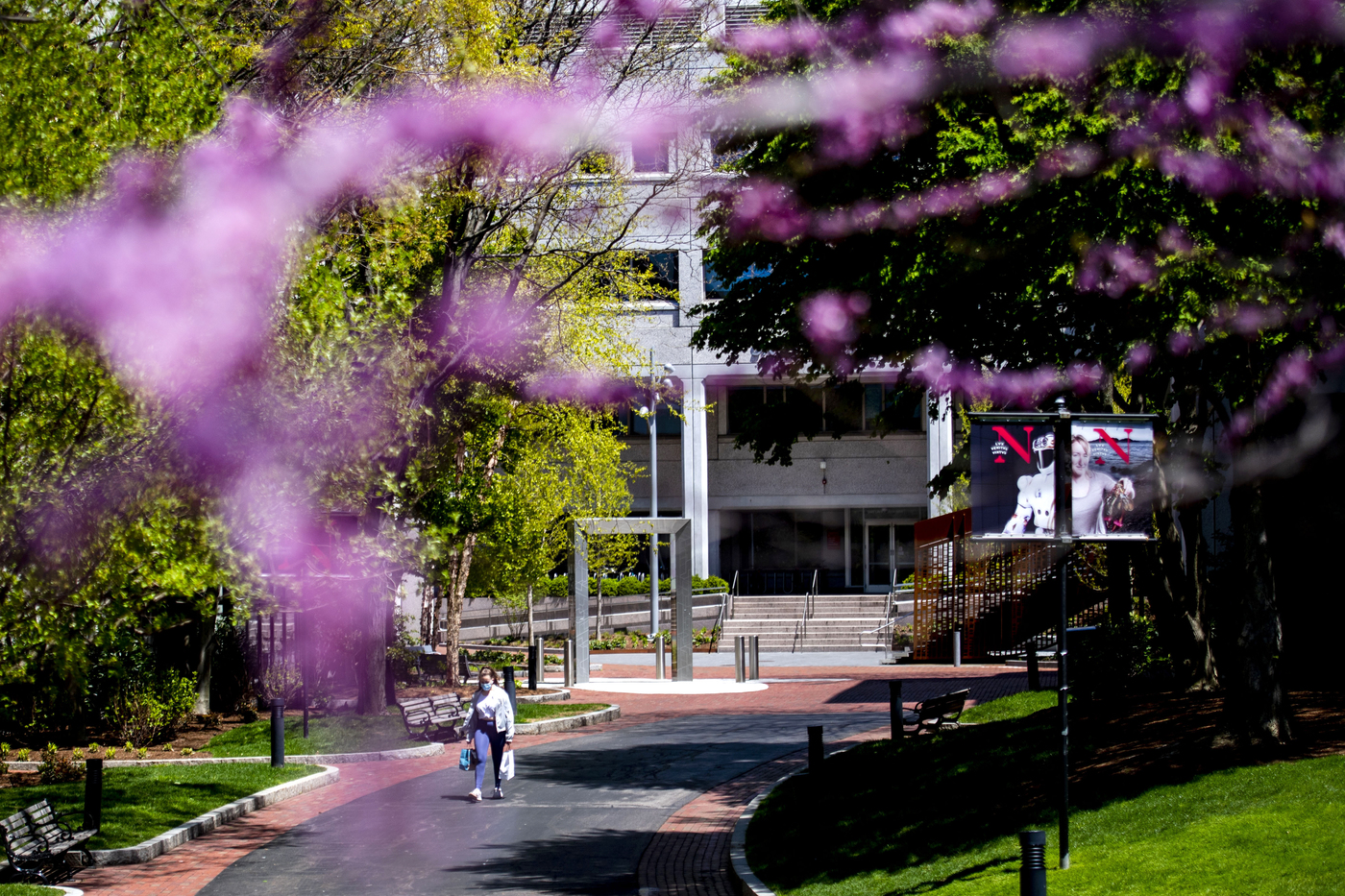
Fatemah Mukadum is a College of Science chemistry and chemical biology major with a minor in computer science, graduating this spring. She will be taking over our Instagram on Wednesday, April 27, to share a day in her life as a Northeastern student.
Q: Why did you decide to enroll at Northeastern University and pursue this specific course of study?
I’ve loved chemistry ever since high school; I had a fantastic advanced placement chemistry teacher who made the concepts understandable and exciting. From this, I knew I wanted to major in it. My minor in computer science stemmed from my undergraduate research. After working in a computational chemistry lab, I wanted to gain more programming skills. Northeastern made it accessible to take computer science classes outside of my major. I really enjoyed the classes, and it has proven to be a vital skill in job interviews, especially in this day and age.
Q: What courses have you enjoyed most?
I really enjoyed my object-oriented design class. I was able to take it over the summer and had the chance to immerse myself in the material. I coded games and an animator, which I never thought I’d be able to do. I also made sure to take some ‘for fun’ classes at Northeastern, such as piano and introduction to acting. They helped break up my heavy course load and exposed me to areas outside STEM.
Q: Tell us about your research experiences at Northeastern.
Through the College of Science, I’m incredibly grateful to have conducted research in computational chemistry for the past four years with Professor Steven Lopez, where I published two papers.
In Professor Lopez’s lab, I used computational software and methods to understand organic reactions. For the first paper I published with him, I computed the wavelengths of light required to fluoresce a set of organic fluorophores. Fluorophores are molecules used for medical imaging because of how they light up, and substituent placement can tune the wavelength of light required to fluoresce the molecule.
I was the first author for my second paper, where I incorporated machine learning and computational chemistry to find molecules that can be used for light-activated targeted therapies. Specifically, along with our collaborators, I implemented a machine learning method, Active Search, to search a new class of photoswitches. Photoswitches are molecules that physically change shape when exposed to light, and this property can be exploited to create light-activated drugs.
Q: Tell us about your co-op experiences.
My first co-op was with Spectral Sciences Inc. in Burlington, MA. In this role, I tested the functionality of scientific/mathematical computer software algorithms. This was my first real work experience, where I learned how to navigate the responsibilities of a job.
My second co-op was with Professor Lopez at Northeastern. My job began when the pandemic had us all at home, but I was able to work virtually performing computational chemistry research full time. I discovered my passion for research through this role, realizing that I want to pursue a graduate degree.
My third co-op was at Kymera Therapeutics in Watertown, MA. After refining my computer science skills at my first co-op and working on my research skills for my second, I wanted to apply what I had learned to the industry. Working at Kymera was a dream come true; it incorporated everything I was looking for from a co-op: a fantastic company culture, computational chemistry research, and the ability to contribute to a more significant cause by bringing therapy to patients. After my co-op ended in December of 2021, I decided to stay part-time because I loved the work!
Q: Do you feel that completing five years with three co-ops has been advantageous for you?
Absolutely! I am very confident in my career choice because of my co-ops. After each experience, I learned even more about what I did and didn’t like to do. Since I returned to classes after each co-op, I was able to gain different skills for my next opportunity. Completing five years with three co-ops gave me enough experience to go straight to graduate school after my undergraduate education. I feel I would have had to take a gap year otherwise.
Q: Tell us about your involvement on and off-campus.
In addition to co-ops and research, I have volunteered on campus. In my second and third years, I was involved in Peace Through Play. Here, I led a group of classroom volunteer students in teaching younger students about core values such as teamwork and conflict resolution. In addition, I proposed new ideas and took part in logistical decision-making.
During my third and fourth years at Northeastern, I participated in the Northeastern University Global Health Initiative as its conference director. I organized the largest undergraduate-led conference, COVID-19 and Racial Equity (CARE 2021). My work included reaching out to potential speakers, coordinating workshops and programming, and securing funding.
My undergraduate experience was heavily influenced by my involvement in the South Asian Organization, undergraduate research, co-ops, study abroad, volunteering, and global health advocacy. Through the South Asian organization, I found a group of lifelong friends and got a taste of home with events such as Diwali/Eid dinners and Holi.
Additionally, in my first summer semester, I went on a Dialogue of Civilizations to Brazil, where I learned about sustainable energy and Brazilian culture.
Q: What advice do you have for students in similar fields?
My first piece of advice would be to start early, trying anything and everything. Take random classes; accept that co-op that might be outside your comfort zone. I highly recommend joining a lab for students who want to work in research. I realized my passion because of the undergraduate research I conducted with Professor Lopez. This experience also helped me get my first co-op. I also recommend following through on every interview, interaction, or connection you make. I was able to get my dream co-op because my interviewer remembered me from an interview I did for my first co-op, where I didn’t even get the job!
Q: What is next for you post-graduation?
Through all my experiences, I’m happy to share that I will be attending NYU for their chemistry Ph.D. program this coming fall, and I genuinely have Northeastern to thank for that.

